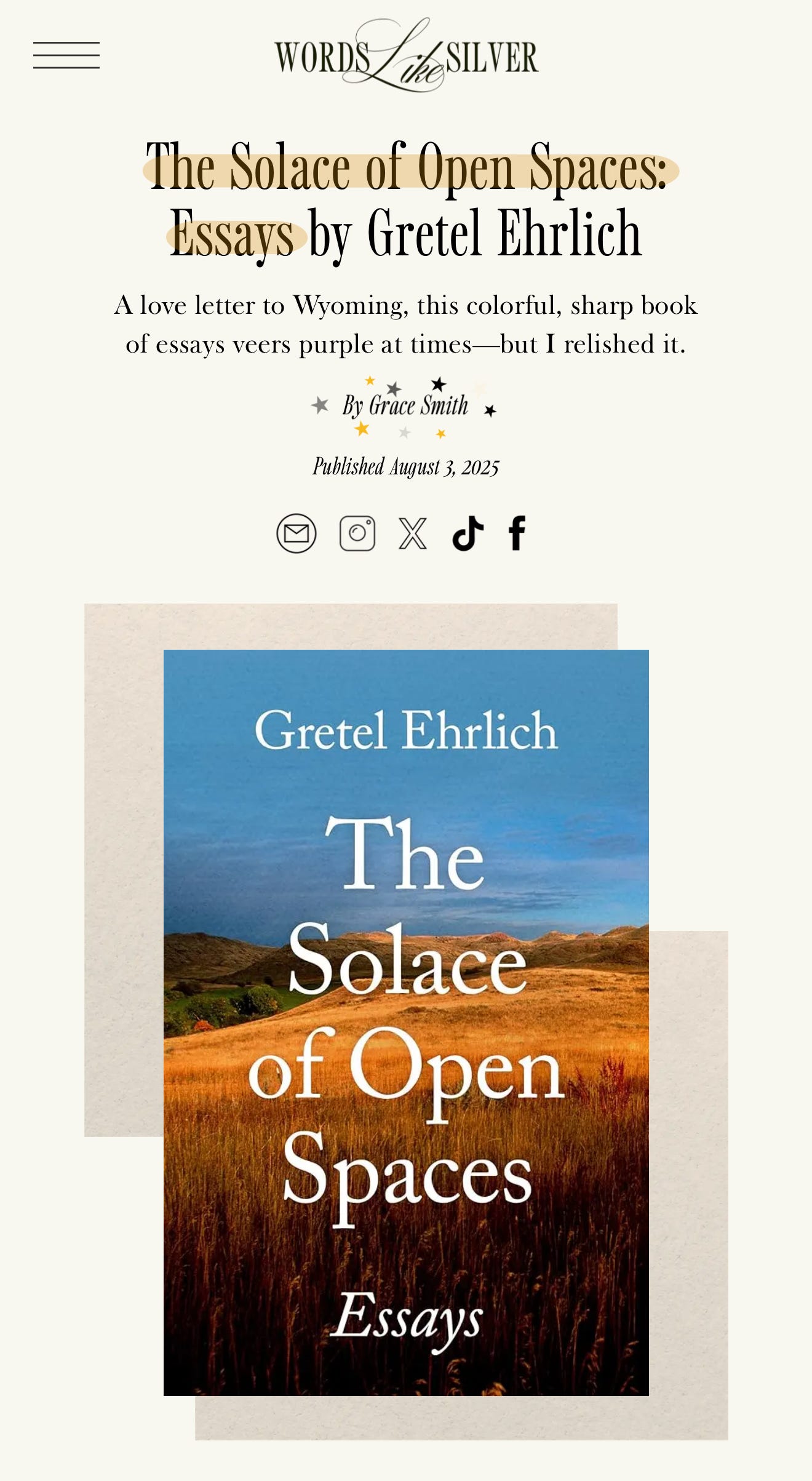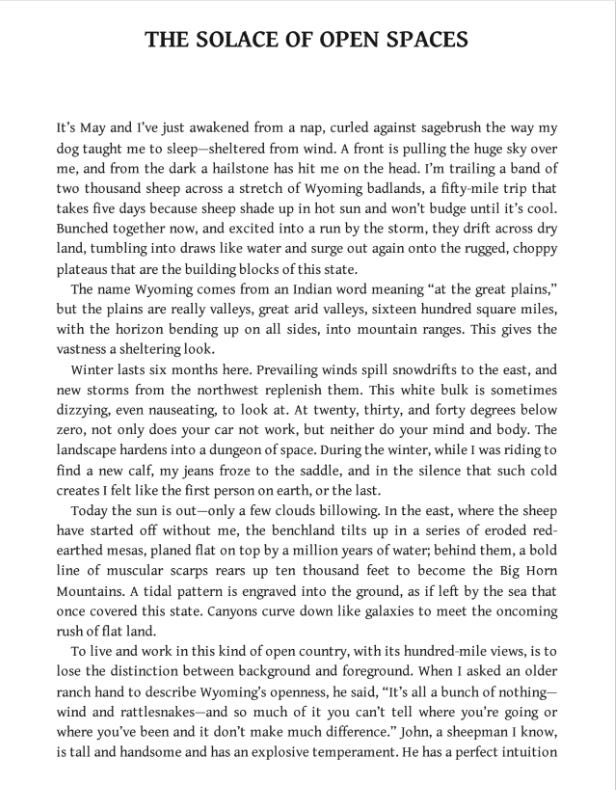The Solace of Open Spaces: Essays by Gretel Ehrlich — Book Review + Discussion
A love letter to Wyoming, this colorful, sharp book of essays veers purple at times—but I relished it.
To see this book review in its full visual glory, read it on the book blog I’ve been running since 2011. (I know—how vintage!) Still, I’m glad you’re reading in any format, so the full text is below:
Book: The Solace of Open Spaces: Essays by Gretel Ehrlich
Release Date: 1986
Publisher: Penguin Books
Format: eBook
Source: Library
Posted: August 3, 2025
Poet and filmmaker Gretel Ehrlich went to Wyoming in 1975 to make the first in a series of documentaries when her partner died. Ehrlich stayed on and found she couldn’t leave. The Solace of Open Spaces is a chronicle of her first years on “the planet of Wyoming,” a personal journey into a place, a feeling, and a way of life.
Ehrlich captures both the otherworldly beauty and cruelty of the natural forces—the harsh wind, bitter cold, and swiftly changing seasons—in the remote reaches of the American West. She brings depth, tenderness, and humor to her portraits of the peculiar souls who also call it home: hermits and ranchers, rodeo cowboys and schoolteachers, dreamers and realists. Together, these essays form an evocative and vibrant tribute to the life Ehrlich chose and the geography she loves. Originally written as journal entries addressed to a friend, The Solace of Open Spaces is raw, meditative, electrifying, and uncommonly wise. In prose “as expansive as a Wyoming vista, as charged as a bolt of prairie lightning” (Newsday), Ehrlich explores the magical interplay between our interior lives and the world around us.
Why I Picked It Up
This year, I’ve been reading a lot of what I’d call very straightforward travel writing. Observational in style, detailed, and precise. You could read it in Peter Matthiessen or in a print article in Robb Report or AFAR just as easily.
Informally, my writing often feels split into two halves of my brain (although both are united by a passionate love for sense of place.) There’s my travel journalism portion, which has largely been on the backburner this year as I dealt with [redacted book process], and there’s the literary side—place as character, sentient, atmospheric. Many of my favorite, most influential books treat a landscape as spiritual, metaphorical terrain (my own included.)
Of course, I love sentimental nature writers too, like Mary Oliver. I enjoyed Instructions for Traveling West by Joy Sullivan (lovely but corny) which has one of my favorite poems in it about octopus hearts. Last year, I spent so much time holed up working on my book as it wrung me out to dry repeatedly that this year, I’ve felt so much more grounded when hiking, exploring, and largely refusing to spend more time indoors than necessary.
When I worked a ski season out West—which I long to do again—I was on the fence between Park City, which I’d been to before, and Jackson Hole, which I hadn’t. I had plenty of friends in the latter town and none in the former, but a room in Utah opened first; thus, my decision was made. Still, like I said, I’ve been on a cowboy kick; I do feel that frontier-induced longing, belt out ‘Wide Open Spaces,” and know, for my own sanity, I should always choose to live somewhere with a vivid outdoors scene if I’m able to pick for myself. Westworld is probably my favorite show of all time, I’ve just started Yellowstone for the first time, and I do consulting and marketing work for an author whose book takes place in Wyoming.
And, of course, all those references are only the flattened, aestheticized West that scratches the itch on a surface-level, so I also wanted to read about the quote-unquote “real” Wyoming. When my library hold came in, this seemed right up my alley. Even in the title: solace in open spaces. Me too. (Also on deck: Desert Solitaire, but that’s about Utah.)
What I Thought
Immediately upon opening The Solace of Open Spaces, there were lines that viscerally gripped me and others that felt too flowing and abstract. I love poetics, but also tend to need some grounding. (Ex: Mary Oliver works for me; Ocean Vuong does not.) Especially when dealing with the poetics of the outdoors, I need prose that feels almost like you could rub its nose in the dirt, so to speak. Or like, when hiking previously, the writer has accepted the grit in their Nalgene as unavoidable trail spice.
I’m no stranger to experimental metaphorical weirdness (see: my love for Autobiography of Red by Anne Carson) but I see nature basically as the quickest shortcut to “earned” beauty and feel like the prose dealing with it should be held to the same standards. Sometimes, you’ll look at a literary review in a genre like this and feel like it’s all word salad and posturing. So, in summary: I felt the place seeping through the words at first glance, but got nervous upon first impression that the collection would tip too far into nonsense.
Ultimately though, it straightened out pretty quickly. Ehrlich writes about heading to Wyoming first to work on a documentary project as one of the final creations of her dying partner, where she first learned about sheep herding, ranch culture, and the overall feel of the space. I thought she did a phenomenal job characterizing what daily living there—at least in the ‘80s—was actually like.
For example, I read a lighthearted Western romance series earlier in the year (which I liked but heavily critiqued) and noted someone driving multiple hours for a dinner event then turning around and heading home the same evening, which felt weird. After reading about the culture fleshed out in this book, it makes a whole lot more sense how normal that is between neighbors. Some books focus too much on the landscape or too much on the people, but The Solace of Open Spaces had a healthy balance that deftly zoomed in and out as needed.
Or—relatedly—I read a book about a bullrider (it was fine—like with the hockey books, I learned the term “buckle bunny” hahaha) which explained some of how it worked, but she did such a clear job explaining how a rodeo worked, what skills were needed for each event, etc.
Of course, there is a lot of “we” in regards to the population of Wyoming, and like most population studies, you need to acknowledge it’s not referring to every single person’s trait to be “made quiet” by the landscape or whatever she’s characterizing. It also speaks to the naïvety of city liberals (essentially) who assume this flavor of libertarianism/isolationism must be ignorant. There’s discussion of the masochism of assuming chosen solitude might be an anecdote to solitude, character changing with the seasons, the consequences of nature, etc. The way Ehrlich talked about the clarity of working with animals was deeply compelling.
Certain lines and moments still felt a tad purple, but I’m so weak for any piece of literature that feels like a distinctive, specific love letter to a region or area—like it captures the nuance that adds character, so it was overall a winner for me. It probably lands somewhere between Peter Matthiessen and Mary Oliver, with a particular flavor of Meghan O’Rourke—and strikes me as absolutely devoted to Wyoming. Lines like “’It’s all a bunch of nothing—wind and rattlesnakes—and so much of it you can’t tell where you’re going or where you’ve been and it don’t make much difference’” feel distinctly McCarthy-ish, preferably accompanied by a spat into the dirt.
I did send this title to multiple people this weekend who I thought might love it, and still have others in mind I think would mesh with it entirely; for example,
responded to say it was already his favorite book of all time, and he even sent me a picture of the copy he’d taken along with him on his summer travels. So I suppose my targeting was accurate there. Looks like a trip to Jackson might have to be a priority of mine soon too?Some Lines I Loved
True solace is finding none, which is to say, it is everywhere.
“All through autumn we hear a double voice: one says everything is ripe; the other says everything is dying. The paradox is exquisite.”
“Disfigurement is synonymous with the whole idea of a frontier. As soon as we lay our hands on it, the freedom we thought it represented is quickly gone.”
“To live and work in this kind of open country, with its hundred-mile views, is to lose the distinction between background and foreground.”
“Afterward we skated on the small pond in front of the house and drank from open bottles of champagne stuck in the snow.”
“Some kinds of impermanence take a long time.”
For fans of:
The Snow Leopard by Peter Matthiessen; Upstream by Mary Oliver; The Long Goodbye by Meghan O’Rourke; After the North Pole by Erling Kagge; Ansel Adams; etc.
Related Book Discussions:
The Snow Leopard by Peter Matthiessen
The Long Goodbye by Meghan O’Rourke
Upstream by Mary Oliver
Travels in Alaska by John Muir
All My Book Reviews* (needs updating)



